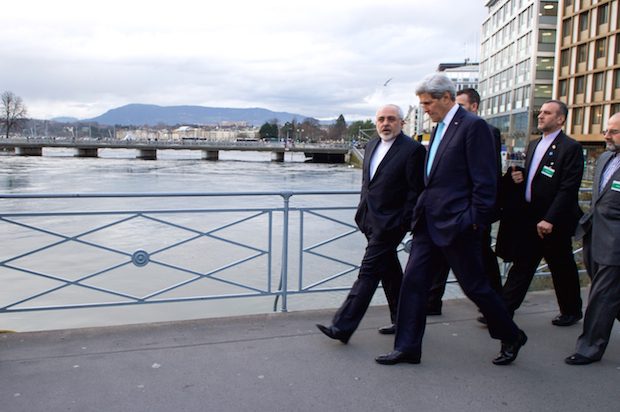The Nuclear Deal and the Ten Sailors

Dan Drezner’s reviews the story of Iran’s brief detention of 10 U.S. sailors after they had accidentally drifted into Iranian waters, and here’s what he finds:
So, to sum up: Compared to a similar incident in 2007, this was handled much more quickly and with a minimum of fuss. It’s almost as if U.S. diplomacy toward Iran has yielded some benefits or something.
Many opponents of the nuclear deal were quick to declare that this episode was a “humiliation” for the U.S. and proof that the nuclear deal was allowing Iran to misbehave. Sen. Cotton was predictably one of the first out of the gates to use the news as another excuse to attack the deal. Cotton went so far as to declare the detention an “openly hostile action” despite the fact that it occurred in Iranian waters. Sen. Gardner (R-Colorado) suggested that the president delay his State of the Union address. In general, Iran hawks responded to a minor, easily solved problem with a mix of panic and irresponsible alarmism. Drezner credits Rubio with a more responsible reaction, and compared to the others that’s true, but note that he still used this minor episode to denounce the nuclear deal and vow to renege on it. That’s a short-sighted and foolish position for Rubio to hold even if he didn’t set his hair on fire over the brief detention of the sailors, because so far Iran is complying with its commitments under the deal:
An evaluation of the agreement must begin with how it is being implemented. On this front, the JCPOA has exceeded expectations, as the Iranians have moved more quickly than experts expected to dismantle the nuclear program.
In short, Rubio wants to tear up a deal that Iran is abiding by and that has already made significant progress in restricting Iran’s nuclear program. He may have handled the smaller issue well, but on one of the biggest issues of U.S.-Iranian relations Rubio has taken a ridiculously hard-line position.
As Drezner says, all of the facts suggest that the episode was resolved as quickly and peacefully as it was because of the direct channels of communication created by the diplomatic exchanges over the nuclear issue in the last two years. In the absence of the deal and the diplomatic contacts that were created through the negotiating process, it is probable that it would have taken much longer to get the sailors released. This episode reminds us of the value of keeping open diplomatic channels, and that value only increases when it involves regimes with which the U.S. has generally poor and adversarial relations. If the U.S. and Iran had normal diplomatic relations, it is likely that more serious incidents and problems could be resolved in a similar fashion or even headed off in advance. Failing that, it would be folly to throw away the fruits of successful negotiations with Iran, and that is what Iran hawks insisted on in response to this easily-solved problem.
Comments